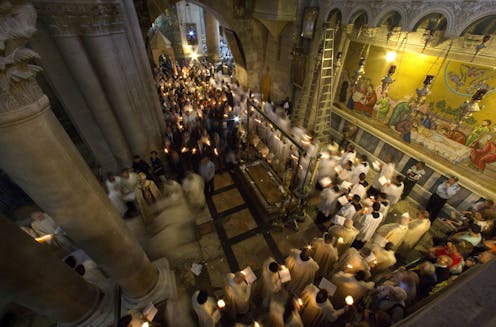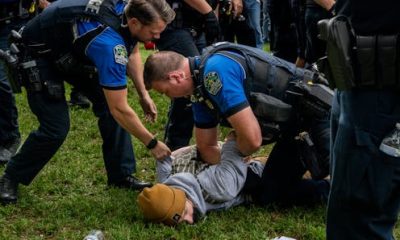
A procession at the Church of the Holy Sepulchre, believed by many Christians to be the site of the crucifixion and burial place of Jesus Christ. AP Photo/Sebastian Scheiner
Every year, Christians from across the world visit Jerusalem for Easter week, walking the Via Dolorosa, the path Jesus is said to have walked on the way to his crucifixion over 2,000 years ago. Easter is the holiest of days, and the Church of the Holy Sepulchre, the site where Jesus is believed to have died, is one of the most sacred sites for Christians.
But not all Christians have equal access to these sites. If you are a Christian Palestinian living in the city of Bethlehem or Ramallah hoping to celebrate Easter in Jerusalem, you have to request permission from Israeli authorities well before Christmas – without guarantee that it will be granted. Those were the rules even before Oct. 7, 2023, when Hamas launched an attack on southern Israel. The Israeli response to the Hamas attack has resulted in even more severe restrictions on freedom of movement for Palestinians in the West Bank.
The site where the Bible says Jesus was born, in Bethlehem, and the place he died, in Jerusalem, are only about six miles apart. Google Maps indicates the drive takes about 20 minutes but carries a warning: “This route may cross country borders.” That is because Bethlehem is located in the West Bank, which is under Israeli military occupation, whereas Jerusalem is under direct Israeli control.
As a human rights scholar and Christian Palestinian who grew up in Bethlehem, I have many fond memories of Easter, which is a special time of gathering and celebration for Christian Palestinians. But I also saw firsthand how the military occupation has denied Palestinians basic human rights, including religious rights.
A season of celebration
Traditionally, Palestinian families and friends exchange visits, offering coffee, tea and a cookie stuffed with dates called “maamoul,” which is made only at Easter. A favorite tradition, especially for children, is taking a colorfully dyed hard-boiled egg in one hand and cracking it against an egg held by a friend. The breaking of the egg symbolizes the rise of Jesus from the tomb, the end of sorrow and the ultimate defeat of death itself and purification of human sins.
For Orthodox Christians, one of the most sacred rites of the year is the Holy Fire. On the day before Orthodox Easter, thousands of pilgrims and local Christian Palestinians of all denominations gather in the Church of the Holy Sepulchre. Greek and Armenian patriarchs enter the enclosure of the tomb in which Jesus was said to have been buried and pray inside. Those inside have reported that a blue light rises from the stone where Jesus lay, and forms into a flame. The patriarch lights candles from the flame, passing the fire from candle to candle among the thousands assembled in the church.
That same day, delegations representing Eastern Orthodox countries carry the flame in lanterns to their home countries via chartered planes to be presented in cathedrals in time for the Easter service. Palestinians also carry the flame using lanterns to homes and churches in the West Bank.
Christians celebrate the Holy Fire under Israeli restrictions in 2023.
Deep roots in the Holy Land
Palestinian Christians trace their ancestry to the time of Jesus and Christianity’s founding in the region. Many churches and monasteries flourished in Bethlehem, Jerusalem and other Palestinian towns under Byzantine and Roman rule. Throughout this period and into the modern day, Christians, Muslims and Jews lived side by side in the region.
With the Islamic conquest in the seventh century, the majority of Christians gradually converted to Islam. However, the remaining Christian minority persisted in practicing their religion and traditions, including through the rule of the Ottoman empire, from 1516 to 1922, and to the present day.
The establishment of Israel in 1948 led to the expulsion of 750,000 Palestinians, over 80% of the population, which is referred to by Palestinians as the “nakba,” or the catastrophe. Hundreds of thousands became refugees throughout the world, including many Christians.
Christians accounted for about 10% of the population in 1920 but constitute just 1% to 2.5% of Palestinians in the West Bank as of 2024, because of emigration. Christians in the West Bank belong to multiple denominations, including Greek Orthodox, Catholic and various Protestant denominations.
Thousands of Palestinians rely on the pilgrims and tourists who come to Bethlehem every year for their livelihoods. Two million people visit Bethlehem annually, and more than 20% of local workers are employed in tourism. Another important local industry is carved olive wood handicrafts. In 2004, the mayor of Beit Jala, which borders the city of Bethlehem, estimated 200 families in the area made their living from carving olive wood. Christians around the world have olive wood nativity sets or crosses carved by Palestinian artisans, a tradition that has been passed down through generations.
Impact of the occupation
The neighborhoods of the occupied West Bank have been fragmented by the building of over 145 illegal Israeli settlements. Both Christian and Muslim Palestinians face huge barriers to accessing holy sites in Jerusalem.
An Israeli policeman stands guard during a March 1997 procession of Franciscan monks led by traditionally dressed guards coming out of the Church of the Holy Sepulchre in Jerusalem’s Old City.
AP Photo/Peter Dejong
Bethlehem is encircled by several Jewish-only settlements, as well as the separation wall built in the 2000s, which snakes around and across the city. Across the West Bank, over 500 checkpoints and bypass roads designed to connect settlements have been built on Palestinian lands for the exclusive use of settlers. As of Jan. 1, 2023, there were over half a million settlers in the West Bank and another 200,000 in East Jerusalem.
The highways and bypass roads cut through the middle of towns and separate families. It is a system that former President Jimmy Carter and numerous human rights groups have described as “apartheid.” This system severely restricts freedom of movement and separates students from schools, patients from hospitals, farmers from their lands and worshipers from their churches or mosques.
Additionally, Palestinians have a different license plate color on their cars. They can’t use their vehicles to access private roads, which restricts their access to Jerusalem or Israel.
Going far beyond separate roads, Palestinians in the West Bank are subject to a separate legal system – a military judicial system – whereas Israeli settlers living in the West Bank have a civilian court system. This system allows indefinite detention of Palestinians without charge or trial based on secret evidence. All of these restrictions on freedom of movement disrupt the ability of Palestinians of all faiths to visit holy sites and gather for religious observances.
Prayers for peace
The barriers to celebrating Easter, especially this year, are not just physical but emotional and spiritual.
As of March 25, 2024, the number of Gazans killed in the war had surpassed 32,000 – 70% of them women and children, according to Gaza’s health ministry. Israel has arrested 7,350 people in the West Bank, with over 9,000 currently in detention, up from 5,200 who were in Israeli prisons before Oct. 7, 2023.
Israel bombed the world’s third oldest church, St. Porphyrius Greek Orthodox Church, in Gaza in October 2023, killing 18 of the more than 400 people sheltering there.
Christian Palestinians in the West Bank suspended celebrations for Christmas in 2023 in hopes of bringing more attention to the death and suffering in Gaza. But the situation has only worsened. An estimated 1.7 million Gazans – over 75% of the population – had been displaced as of March 2024, half of them on the verge of famine.
Many Palestinians have long turned to their faith to endure the occupation and have found solace in prayer. That faith has allowed many to hold on to the hope that the occupation will end and the Holy Land will be the place of peace and coexistence that it once was. Perhaps that is when, for many, Easter celebrations will be truly joyful again.
Roni Abusaad does not work for, consult, own shares in or receive funding from any company or organization that would benefit from this article, and has disclosed no relevant affiliations beyond their academic appointment.
Advertisement

Advertisement
Contact Us
If you would like to place dofollow backlinks in our website or paid content reach out to info@qhubonews.com











